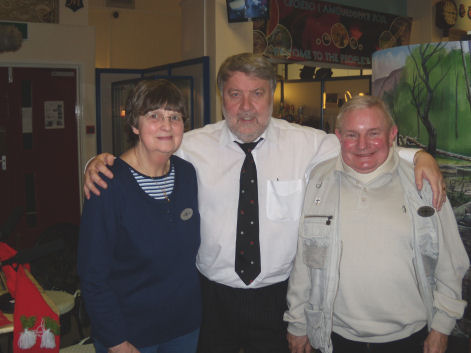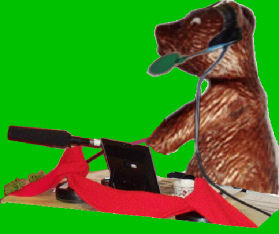Fund raising March - £663
This included £218 as a share of the proceeds of the archaeology lectures run by Frank Olding, £137 from the coffee morning and £100 from the BBC following the broadcast of the Roy Noble Show from the Metropole (we hope you all heard Don on the radio!).
We are also grateful for a grant of £4534 from Communities First to fund the cost of new exhibition screens and textile conservation, and a donation of £50 arranged by Councillor Nigel Daniels. We also had £478 from the Capital Assistance Grants Scheme administered by GAVO – this will be used to buy bookshelves for the office, a baby changer, and table mats for the café.
Thank you Jeanette Fulton
All donations are most welcome but we must give a special thank you to Jeanette Fulton, an American friend of Vera Smith, who has generously donated $400. We are sure Vera will be able to report back to Jeanette that the donation will be put to good use.
Raffle prizes
Items needed, please, including for the hamper which will be the main raffle prize at the Ralph Robinson Memorial Lecture on 5 th May.
Diary Dates
Wednesday 7 th April 2010 – Victorian Internet by Malcolm Johnson
Wednesday 5 th May 2010 – Ralph Robinson Memorial Lecture Owain Glyndwr by Chris Barber
Saturday 8 th May 2010 – Cake Decorating –Coffee Morning 50p
Lectures start at 7.00pm in the Metropole Theatre, with teas and a chat downstairs in the Museum afterwards. Entry is £2 and the public are most welcome.
Get well soon
At the time of preparing this edition of the Newsletter Enid Dean is in hospital. We send our best wishes for a speedy recovery.
Poet’s Corner
FEED THE CHICKENS
Up in our back garden
When I was just a lad
Stood an old chicken cot
A wire run it had.
Corn and tater peelings
We took up every day
Our job to feed the chickens
Before we went to play.
There was a crazy cockerel
Would hide there in the cot
With caution we would enter
‘Til to the trough we got.
Put the chicken food in
Then water in to drink
Out he’d come a’running
No time to even think.
Pecking at our ankles
While you made for the door
I hit him with a bucket once
He fell down on the floor.
I thought Oh Hell I’ve killed him
And went across to see
But just as I got near him
He jumped up chasing me.
And he was growing bigger
As the months went by
In and out the chicken cot
Every day he’d fly.
Why did I put up with it?
I didn’t mind at all
Very soon old Santa Claus
To us would pay a call.
And we would leave a sandwich out
To see he’d not get thinner
Inside the crazy cockerel
Who was our Christmas dinner.
Dagworth Orville Chamber
New Books
A Single Swallow – Following an Epic Journey from Africa to South Wales by Horatio Clare. Paperback due for release in April 2010 by Vintage, price £8.99.
This is the story of a journey taking in slums and palaces, of old empires and modern tribes.
William Hutchings
Last month we featured an article by Mike Everley on his family. Mr Everley is an active contributor to the magazine ‘Ancestors’ and the following piece is drawn from the June 2008 edition.
William Hutchings was killed in a mining accident at the Vivian Colliery in Abertillery in 1921. He suffered a fractured skull through an accidental fall of coal underground, and died at the Royal Gwent hospital. The death certificate stated that an inquest had taken place but although the coroner’s records for that period had not survived, there were reports of the accident in the South Wales Gazette and the South Wales Argus. They reported that the coroner had identified several management failures but had ruled out any liability on behalf of the colliery owners. Mr Everley suggests that this was not uncommon at the time when emphasis was often placed on possible errors by the victim and in this case it was stated that “The victim had moved a post in his attempt to chip the stick”.
The report of the funeral reflected the strong links William Hutchings had with the union and labour movement, the South Wales Argus carrying the headline “Red Flag at Funeral”. There was even more coverage in the South Wales Gazette which included the fact that George Barker MP gave an address and that New Era hymns were sung, the funeral service ending with a rendition of the Red Flag.
The reports also revealed that William Hutchings was involved with the New Era Union in Abertillery, with links to the Independent Labour Party, the Socialist Labour Party and, possibly, the Communist Party.
The New Era Union was formed in America in 1897 as a form of cooperative in which workers owned bonds of the companies in which they worked, but there was a fundamental shift in thinking following the Russian Revolution. The local branch evolved and formed links with other Socialist bodies. The National Library of Wales has a minute book, in William Hutchings’ handwriting, of the Abertillery New Era Union Men’s Sunday Afternoon Class between 1916 and 1919, with records also of meetings with other Labour groups.
Mr Hutchings was evidently active in the local political scene and it is interesting to speculate on how that involvement may have progressed had he not met an untimely death at the age of 33.
Aberbeeg 1920 – The mine that never was
From the early 19 th Century, Aberbeeg had a number of drift mines or levels near the mountain tops - low-cost ventures which produced a popular house coal from the Mynyddislwyn seam. To exploit deeper seams, costly shaft sinking was necessary. The first Aberbeeg Colliery, located not far from the present Hospital Bridge, was financed by William Webb of brewery fame with two mining partners; it started production in 1870 and subsequently operated under a succession of owners until 1920 when production ceased.
A major coal producer at this time in the upper Ebbw Valley was John Lancaster & Co; this organisation was acquired on 19 th May 1920 by the Ebbw Vale Steel, Iron and Coal Co. The company had already embarked on the development of a substantial new mine to work coal in the Lower Coal Measures to the east of the closed Aberbeeg Colliery and shaft sinking began in early 1919. By the summer of that year the company confidently arranged a ceremony of cutting the first turf and a large brick power house was built. Work continued for several weeks when suddenly the site was abandoned. Why? Look back to the war years.
In the early years of World War 1 an understanding had been reached between the Government and Unions that wartime disputes would be settled by arbitration. The Government enacted a ‘Defence of the Realm Act’ giving it additional wartime powers to deal quickly with potential problems. With many European coalfields now in enemy hands, coal production at home had to focus on supporting the war effort and in 1916 the Government used its powers to take direct control for the remainder of the war. The Government controlled output, distribution, sales, recruitment, wages and prices, and received the bulk of the profits. The owners and unions controlled operations and the deployment of manpower. During this time miners enjoyed higher wages and war bonuses.
When peace returned in 1918 the miners’ unions were anxious to return to the pre-war conciliation agreements and the Government was presented with a large pay claim. A Royal Commission led by Sir John Sankey recommended a settlement broadly on the miners’ terms and later in 1920 he also recommended nationalisation. The Government chose instead to set up a Mines Department within the Board of Trade and extended its control until 31 st August 1921.
Aberbeeg new mine was initiated during a period of Government control when prices per ton had increased from 16s 5d in 1913 to 61s 5d in 1920. However, prices soon began falling as European coal production re-started and German reparations were partly accepted in coal. Faced with the need for early price reductions, the mines were returned to their owners in some haste on 31 st March 1921.
The coal owners set out their terms – longer hours, lower pay, and the end of district agreements. This coincided with a long period of recession resulting in wage reductions, lockouts and strikes in 1921, followed in 1926 by the General Strike. The Aberbeeg new mine could not have been conceived at a worse time and mining communities continued to suffer great hardship until the sharp rise in demand for coal with the Second World War. The 1950s saw new mines at Hafodyrynys and Abertillery but they represented the last gasp of a 150 year old South Wales mining industry.
Laurence Hale
The re-birth of the button tin
When I was a child, I was always fascinated by my mother’s ‘button tin’. As I remember it wasn’t a very attractive tin, being quite drab in colour; it measured about 6” by 5” and had a hinged lid. However, once inside, what a treasure. No garment was discarded without the buttons being removed. Sometimes a more exotic button would turn up which I grabbed, as this could be swapped for a button one preferred. I also had my own mini button tin. It was an empty OXO tin which had once held twelve OXO cubes. In here would go my own special buttons which were hoarded for their prettiness but never used.
Then came the more affluent age. A spare button was enclosed with every new garment. Unwanted clothes went to the charity shop buttons intact. Hence the demise of the ‘button tin’. Now I still have my own small button tin. It is hexagonal and quite pretty with kittens painted on it. In here go all those mini plastic bags containing the spare button. Yes there are some really odd unmatched buttons too. Perhaps one day I’ll customise a jumper with them. Anybody want to swap?
Enid Dean
Obituaries
Menna Walters has died after a short illness. Menna was Head of English at Blackwood Comprehensive School and was a dedicated teacher who gave extra tuition in English to those children who needed it, without monetary reward. She was also active politically and was a past Secretary of the Labour Group in Six Bells ward. Life wasn’t all work and politics; as well as a member of the Museum Society, Menna was an ardent Welsh rugby supporter and in later years she enthusiastically took up learning Welsh.
Walter Greaves , husband of Vera, died recently after a period of illness.
We send our condolences to the families and friends of Menna Walters and Walter Greaves.
MUSEUM MATTERS
The museum has had a very busy time of it. We have had visits by 4 groups of French schoolchildren, a delegation from Royat for the twinning of our towns, a visit by Queen Street School and on 19 th March the BBC Roy Noble Radio Programme was broadcast from our museum.
 A History of the World is a unique partnership between the BBC, the British Museum and museums across the UK to celebrate objects which have a story to tell of local significance and global resonance.
A History of the World is a unique partnership between the BBC, the British Museum and museums across the UK to celebrate objects which have a story to tell of local significance and global resonance.
BBC Cymru Wales has gathered objects from museums all over Wales to feature on their website:
This helps tell the story of Wales' influence on the world and the world's influence on Wales by adding more objects to the website - including ones you choose helping to build a unique digital museum that tells A History of the World.
You can also get involved by: Listening to the radio: the BBC Radio 4 series A History of the World in 100 objects will be broadcast throughout 2010 featuring objects from the British Museum; Roy Noble on BBC Radio Wales will feature items from museums in Wales, as will Nia Roberts' show on BBC Radio Cymru
I chose two objects from our collection for the show, Arthur Bobbets medals awarded to him posthumously for trying to save a miner trapped under a fall of roof at six bell Colliery and a 100 year old wooden doll carved by a miner and put in his daughters Christmas stocking To find information about the project and view the digital museum and add your own object at bbc.co.uk/ahistoryoftheworld
Other people who were interviewed were Susanne Allen Manageress of the Metropole, her object was the Scroll for the recent twinning of Abertillery and Royat
Also Guests: Bruna Chezzi, Paulette Polosi and George Hill. Their story was of their Italian relation during the WWII When Italy entered World War Two in 1940, Italian men living in the UK -including those many families owned cafes in the south Wales valleys - were branded by the authorities as enemy aliens. They were interned at camps across the UK and when their numbers grew too big, Commonwealth countries overseas agreed to take some.
On 1st July 1940, the Arandora Star left Liverpool with 800 Italian internees aboard, bound for Canada. On the first night it was torpedoed by a U-boat off Ireland, and sunk. 446 Italian men lost their lives along with many British troops and German POW's.
It will be the 70th Anniversary of the sinking this July - and this tragic event will be commemorated with the unveiling of a permanent memorial in Cardiff.
Bruna Chezzi.is a member of a group of volunteers committed to commemorating the Arandora Star tragedy. The memorial will be unveiled in a ceremony in Cardiff's Metropolitan Cathedral of St David on 2nd July 2010. The memorial is being created by the Welsh Italian artist, Susanna Ciccotti from Swansea and world famous stone carver, leuan Rees from Ammanford. The committee want to contact those Welsh Italian families with connections to the tragedy. Contact Committee Secretary: 029 20460632 • Mobile. 07017 051000. www.arandorastaruvales.us
Email: arandorastar.wales@yahoo.co.uk
Paulette has a roughly cut leather belt which belonged to her grandfather, Guiseppe Pelosi. He miraculously survived after hanging on for hours in freezing, oil-laden Atlantic waters with his friend Angelo Greco. The buckle has his internment number on it. (It will be on Noble's Knick Knack website) Following that Guiseppe was taken aboard another ship which took him on a gruelling 55 day voyage to Australia. Paulette had another relative aboard the Arandora Star her Grandmothers brother Mikele DeMarco. George Hill who is Mikele DeMarco's grandson only recently discovered that he is related to Paulette. George brought a "cross and candle box" With his last match his grandfather was able to light the candle and locate the staircase aboard the Arandora and it helped him find his way out! It will also be online to see (Noble's Knick Knacks).

This was a memorable event for our museum. Roy and his team put everyone at their ease with their kindness and patience. Roy chose the Express Café working exhibit in our museum as an appropriate place to interview his Italian guests.
 Roy Noble, His bus and his team travelling the length and breadth of our country has become an institution and an Ambassador for Wales.
Roy Noble, His bus and his team travelling the length and breadth of our country has become an institution and an Ambassador for Wales.
Don Bearcroft curator


